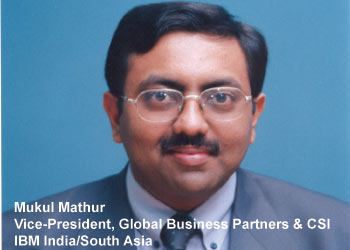The Transformation story starts to unfold for IBM

 Cognitive computing is the ability to unlock the potential in all data - internal, external, structured, unstructured, voice, and visual - and make it work together. Fundamentally IBM embarked into cognitive computing and analytics as a new business area and it continues to make good progress both in terms of its offerings and partner engagement. These solutions are delivered on cloud, which is directed at building more capabilities and solutions across its business partner portfolio.
Cognitive computing is the ability to unlock the potential in all data - internal, external, structured, unstructured, voice, and visual - and make it work together. Fundamentally IBM embarked into cognitive computing and analytics as a new business area and it continues to make good progress both in terms of its offerings and partner engagement. These solutions are delivered on cloud, which is directed at building more capabilities and solutions across its business partner portfolio.
Today everything that IBM does is related to cognitive, and everything that it delivers is through the cloud based delivery model. “We have the cognitive solutions extending all the way into Watson and it talks about how businesses can use cognitive capabilities to take smarter decisions. We also have analytics platform which is all about doing complete data management by looking at your structured and unstructured data and driving sense out of it even before going cognitive. We have an entire set of solution which is around building cloud capability or services, using cloud in an enterprise which focuses on transforming current app to a cloud based delivery model, managing cloud based infrastructure system and so on,” explains Mukul Mathur, Vice-President, Global Business Partners and CSI - IBM India/South Asia.
Surrounding all these solutions, IBM also have a strong portfolio of security. Cyber security is one big area for IBM and it has built several assets or applications in it. It is working with a lot of partners and companies and is helping its clients move to the cloud with confidence. Solutions from IBM Security helps to manage and protect against risks associated with all models of cloud computing.
A Channel-led Transformation
There has been a significant change in the channel landscape of IBM from being pure resellers of products to business partners and are now taking different solution components and combining them together with services and expertise to provide end-to-end solution. The fact that they are now looking at delivering outcome based solutions rather than just technology is the second dimension to it. “The whole element is to bring in industry expertise and knowledge because clients are trying to understand of how these disruptive technologies work and leverage the knowledge that our business partners impart to them to get ahead of their competition. And this becomes bigger and faster as we go forward. We have been doing a lot of things and expect to do lot more. This is indeed an exciting place to be,” says Mukul.
IBM’s core set of partners who have been working for IBM have joined in the transformation journey that it has embarked upon. Over the past 2 years, IBM has gone through the discussion practically across its eco-system. “Good partnership is not about partnering in yesterday’s business; many of our partners have understood that the market keeps on changing and that we are trying to make a transformation. They have agreed to be a part of this transformation and accordingly move their clients along with them. Some of them have however opted out of the transformation because they did not feel they have the capability and the focus to join in it,” explains Mukul.
Since these are areas that require lot of domain knowledge and solution expertise, there have also been new players who have joined in with those expertise and which in most cases complement the existing partner base of IBM by working together. “In a world of infrastructure environment, there can be thousands of players who can come and work with you online. With the cloud evolving and with the ease of partnering in different areas, the number of partners we are working with today would go into thousands,” states Mukul.
Talking about Smart city, Mukul clarifies that IBM has been one of the many companies to have looked into the smarter planet as an area and it has built lot of assets and applications using structured and unstructured data along with our partners across the world. “I believe there is a huge opportunity and we are ready to work with partners in areas that they have worked in and make a difference in building a smarter city. We already have several engagements going on with many state governments. India has the advantage that it can leapfrog in the technology wave and bring more transparency, stability and predictability to the process. And plus we have a very good youth force too,” sums up Mukul.
Samrita Baruah samrita@varindia.com
See What’s Next in Tech With the Fast Forward Newsletter
Tweets From @varindiamag
Nothing to see here - yet
When they Tweet, their Tweets will show up here.






























